Pregnant and depressed: 'I feared they'd take my child if I admitted how I felt'
- Published
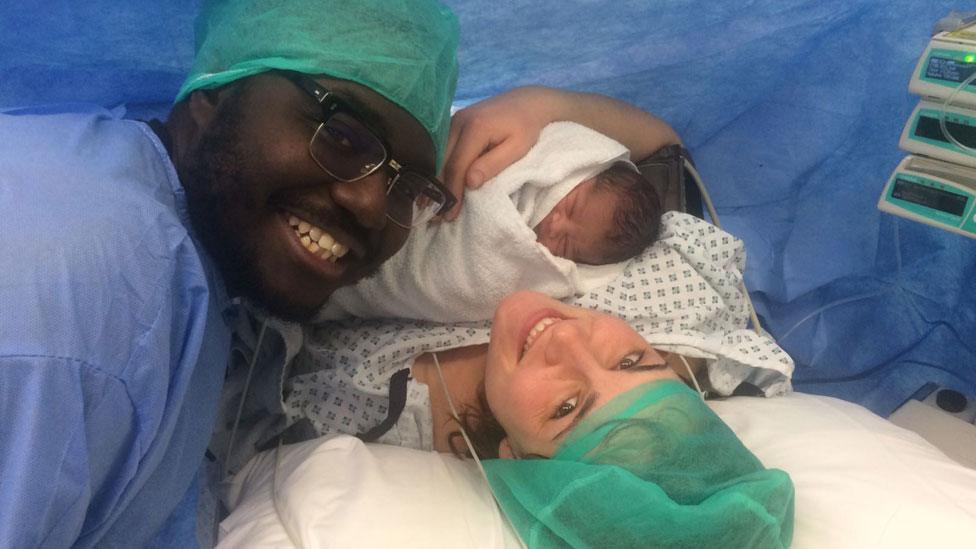
When journalist Anna Ceesay was pregnant with her second child she began to feel depressed and anxious, but kept it a secret from everyone, including her husband, the actor Babou Ceesay. She is now determined to help other parents look after their mental wellbeing.
As any parent of young children will tell you, there are very few moments in the day that you get to yourself, but any moment of stillness can bring with it time to think and time to feel.
"When I woke up I felt it the most," says 33-year-old Anna Ceesay, who had a three-year-old daughter and was six months pregnant with her second child when her problems began. "It was at those moments, early in the morning, I would feel it physically. I literally felt a sinking feeling in my stomach.
"Sometimes it would go away and sometimes it wouldn't, so some days were better than others," she says.
Along with the sinking feeling came anxiety - she was anxious about things she wouldn't usually be anxious about - but she put it all down to the fact that there was a lot going on. She was solo-parenting because her husband was away, working, and their home in Bromley, south London, was being renovated.
The symptoms remained, though, even after the renovations were finished.
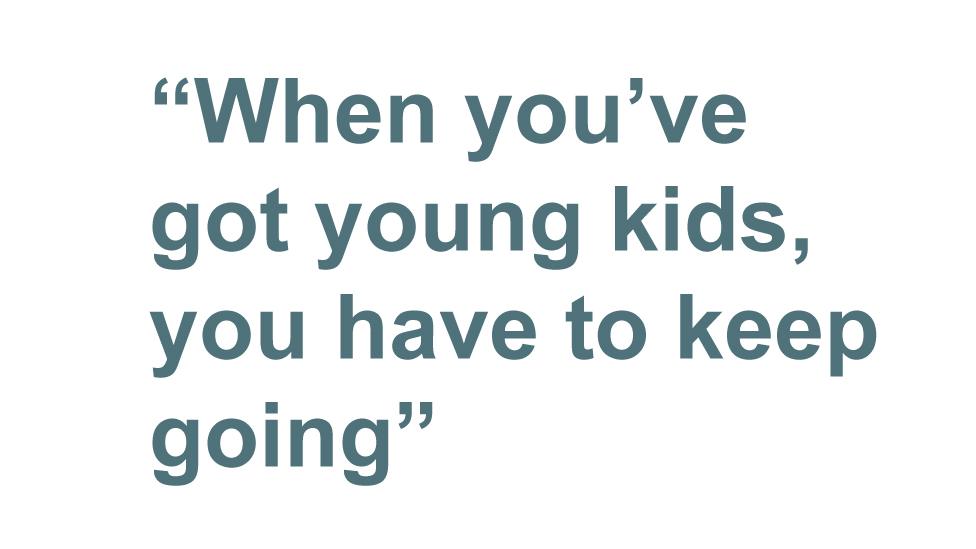
"I would get incredibly anxious about things like cooking," says Anna. "I became convinced that I was going to give everyone food poisoning every time I cooked a roast chicken, even though I did that every weekend. I would obsessively Google how long I needed to cook the chicken for according to the weight, even though I always brought the same size chicken every week.
"I'd just convince myself that I'm going to get it wrong and I'm going to give everyone food poisoning - someone's going to die."
Anna managed to hide her mental health problems from everyone around her - including her husband, parents and friends. She didn't even "really admit it" to herself, she says.
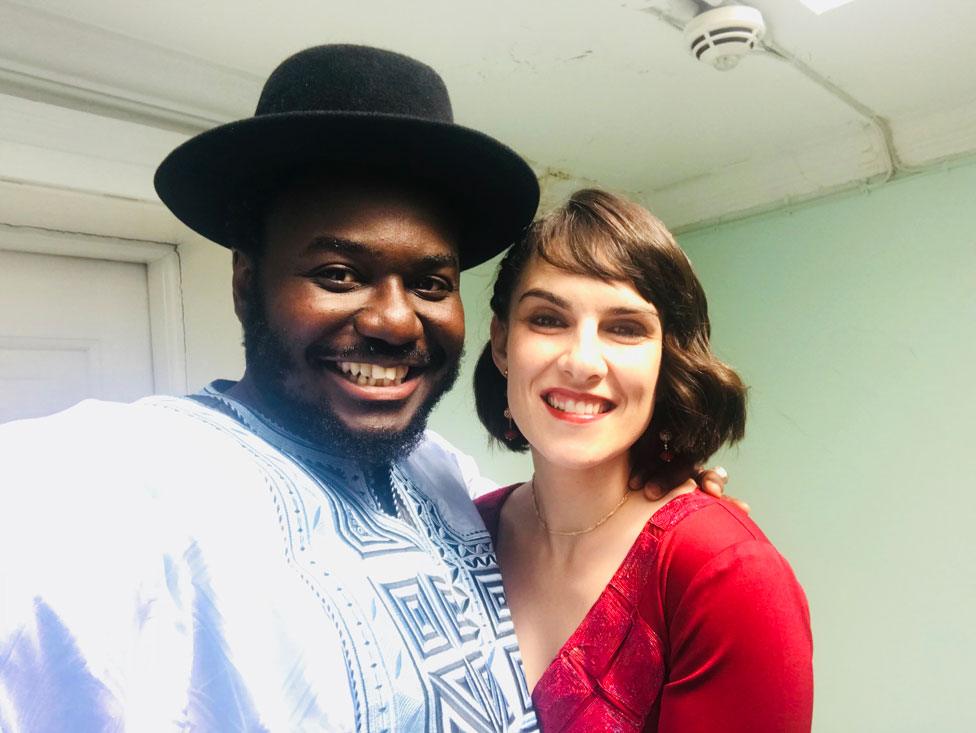
"I think probably I'm not alone, in the sense that when you start to think something's not right, you tend to push it to the back of your mind, just carry on with life and just carry on with the day to day.
"When you've got young kids you have to keep going. So you just put yourself last and keep going on the treadmill of life. It did take me a couple of months to actually think, 'You know what? I can't do this on my own, and I do need to get help,' and when I did that, it was incredibly scary."
Having dropped her daughter off at pre-school one day, Anna sat in her car staring at the number of the Pandas helpline, which gives support to people coping with pre- and post-natal mental illness. Making the call felt like trying to cross a "terrifying chasm", she says.
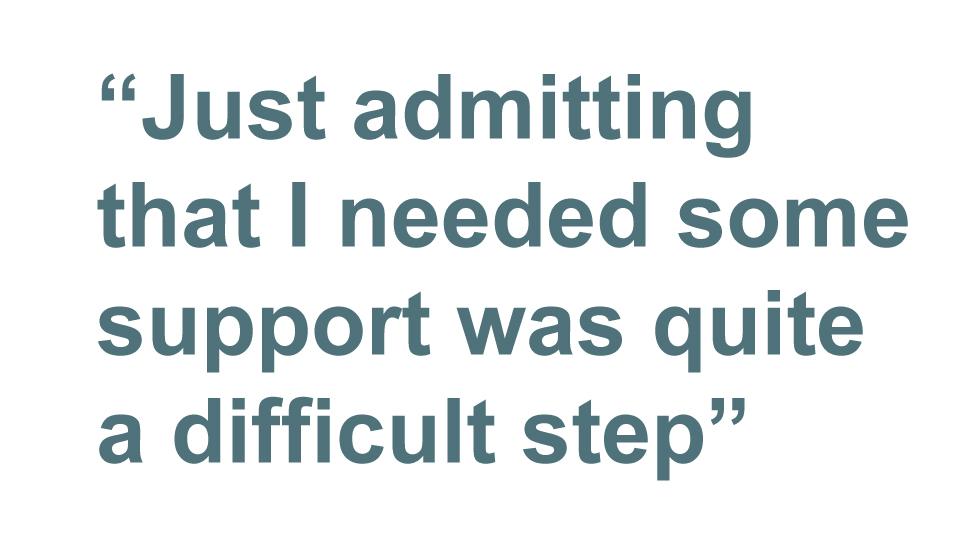
Now eight months pregnant, she had been looking at the number for over a week, but that day had decided to pluck up the courage to call.
"The first time I actually said anything out loud was when I called the Pandas helpline and that was incredibly difficult. I remember sobbing on the phone," she says.
"Just admitting that I needed some support was quite a difficult step for me, because I'm someone who's always taken pride in being really independent and very strong, so to reach out for help is something that I've never really done before."
The woman on the helpline was reassuring. She told Anna she'd had postnatal depression herself, that there was hope and that she would recover. And she urged her to speak to her GP.
"When I put the phone down from her, I then called my husband and that was when I told him and he was actually in America at the time," Anna says.
"I think he was a little bit taken aback and worried because he was away, so I think he felt powerless. I was obviously going through something and he wasn't there."
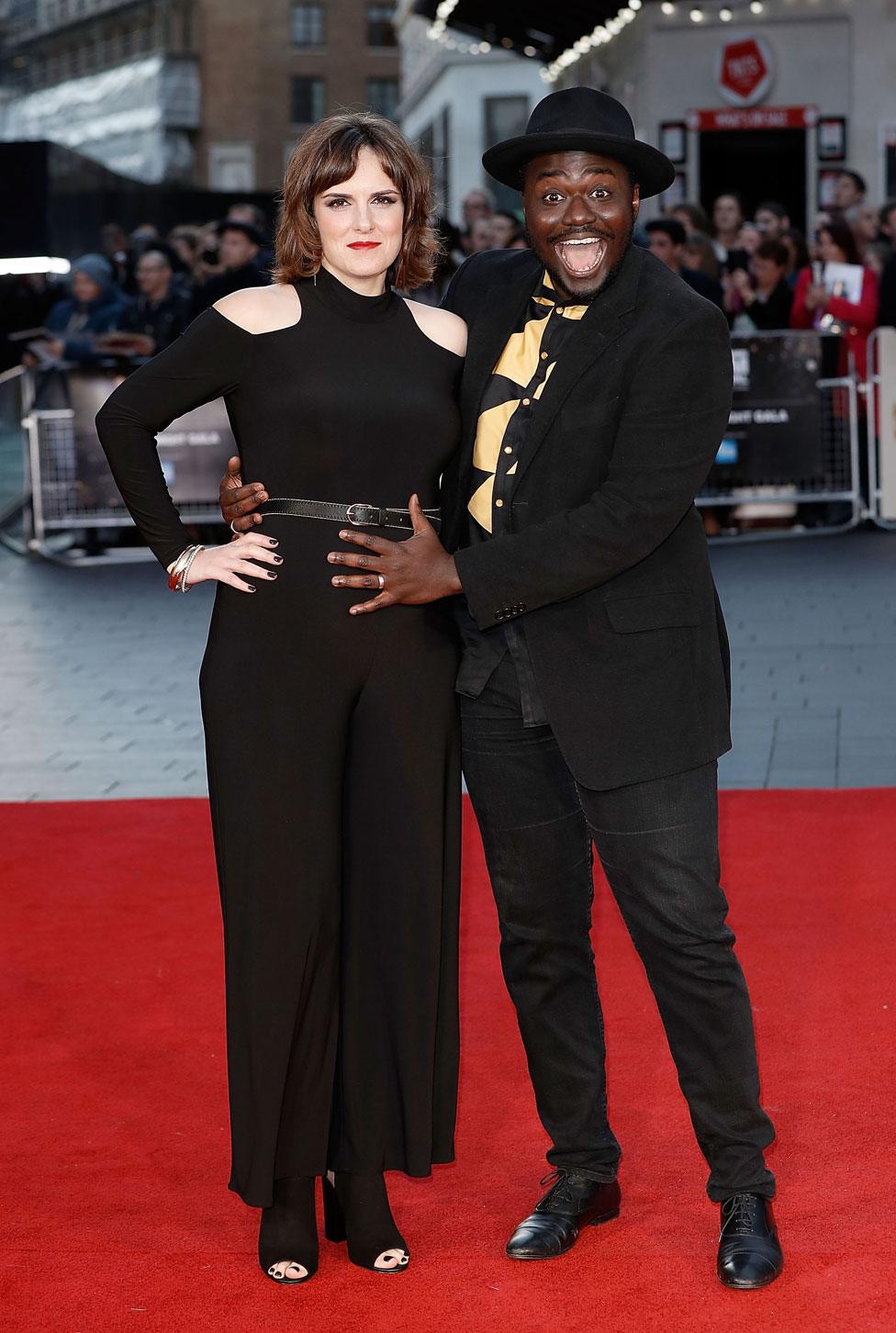

Babou says their busy lifestyles had prevented them from seeing the storm brewing.
"First of all there's this person who I've always looked up to, admired - and suddenly I'm going, 'Wow you are under a huge amount of stress.' I felt an immense amount of sadness. I immediately started thinking of ways to get on a plane and get home as soon as possible," he says.
He describes it as one of the first times in their relationship that he actually went quiet and just listened to what Anna had to say.
"I'm in the house living everyday with her," he says. "So it was a shock, how she could keep how she really felt to herself - and it wasn't an attempt to cover it up, she wasn't even fully aware, because it's gradual - until she suddenly reached that point where she realised, 'I'm not myself.'"


Anna made an appointment with her GP.
But before she told her GP everything - that she was waking up with a sinking feeling in her stomach, that she was getting very anxious about everyday things and that she was feeling low - she spoke to her about her biggest fear. She was terrified about the possible consequences of asking for help.
"I said, 'I'm really scared that if I actually tell you how I'm feeling you're going to take my daughter away,'" says Anna.
"It's quite scary when you've already got children to turn up to the doctor and be like, 'I don't think I'm mentally well.' I've spoken to a lot of women who've told me that that concerns them, that they don't want to go to the doctor because they're worried about the implications for their family and their children."
The doctor looked straight at Anna and told her she had done the right thing and that no-one was going to take her daughter away.
Anna was referred to a local NHS talking therapy team and within two weeks of her GP appointment had received her first therapy session with a perinatal psychotherapist.

Mental health during and after pregnancy
Prof Lorraine Sherr, a clinical psychologist and head of the Health Psychology Unit at University College London, says pregnancy can trigger mental heath problems and exacerbate existing ones.
Symptoms can include tearfulness, lethargy, sleep disturbances and sometimes physical health symptoms.
She says the most important thing to do if you do experience any mental health issue in the perinatal period is to not suffer alone - talk to those around you, to your midwife and healthcare professionals and your GP. You would not hesitate to seek help if you had a physical illness, she says, so the same should apply to mental health.

By her second therapy session, Anna was almost nine months pregnant.
"My therapist said, 'OK, how's your week been?'" says Anna. "And I said I've just found out I've got to have a C-section - and I was devastated about that, because with my first pregnancy, I had a water birth, I didn't have any pain relief. I was very proud of that, very smug, went round telling everyone, 'Isn't that wonderful,' and I wanted to have the same experience again.
"So then to find out that I had to have an elective C-section, obviously the complete opposite of a 'natural birth', that triggered all sorts of anxious thoughts and feelings, because I then felt like, 'Oh I'm already a failure as a mother to this baby, because I can't even give birth to it in a natural way. This is not how it happened last time, I can't cope with it being different.'"
Anna says she talked it through with her therapist who asked her what she would say to a friend who had just found out she had to have a caesarean.
"I said, 'Well as long as the baby's healthy that's fine, it doesn't matter.'"
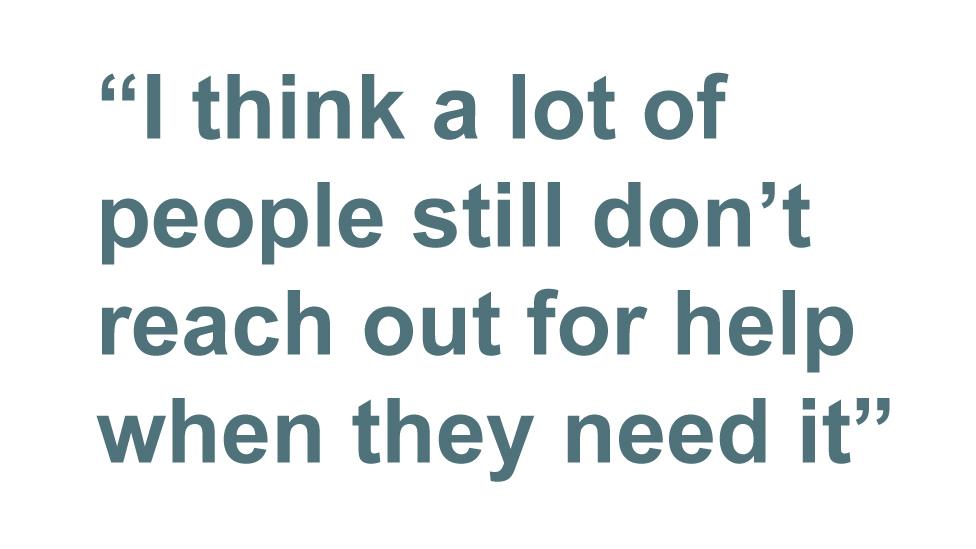
She says she then realised some of the language we use around birth can be unhelpful and that now, a couple of years down the line, how her son got here is irrelevant. Anna says talking it through at the time made her relax and eased her anxiety about having a caesarean.
Anna took a break from therapy when her son was born, but then went back when he was six weeks old and received therapy until he was six months. She says there were ups and downs, but the experience was life-changing.
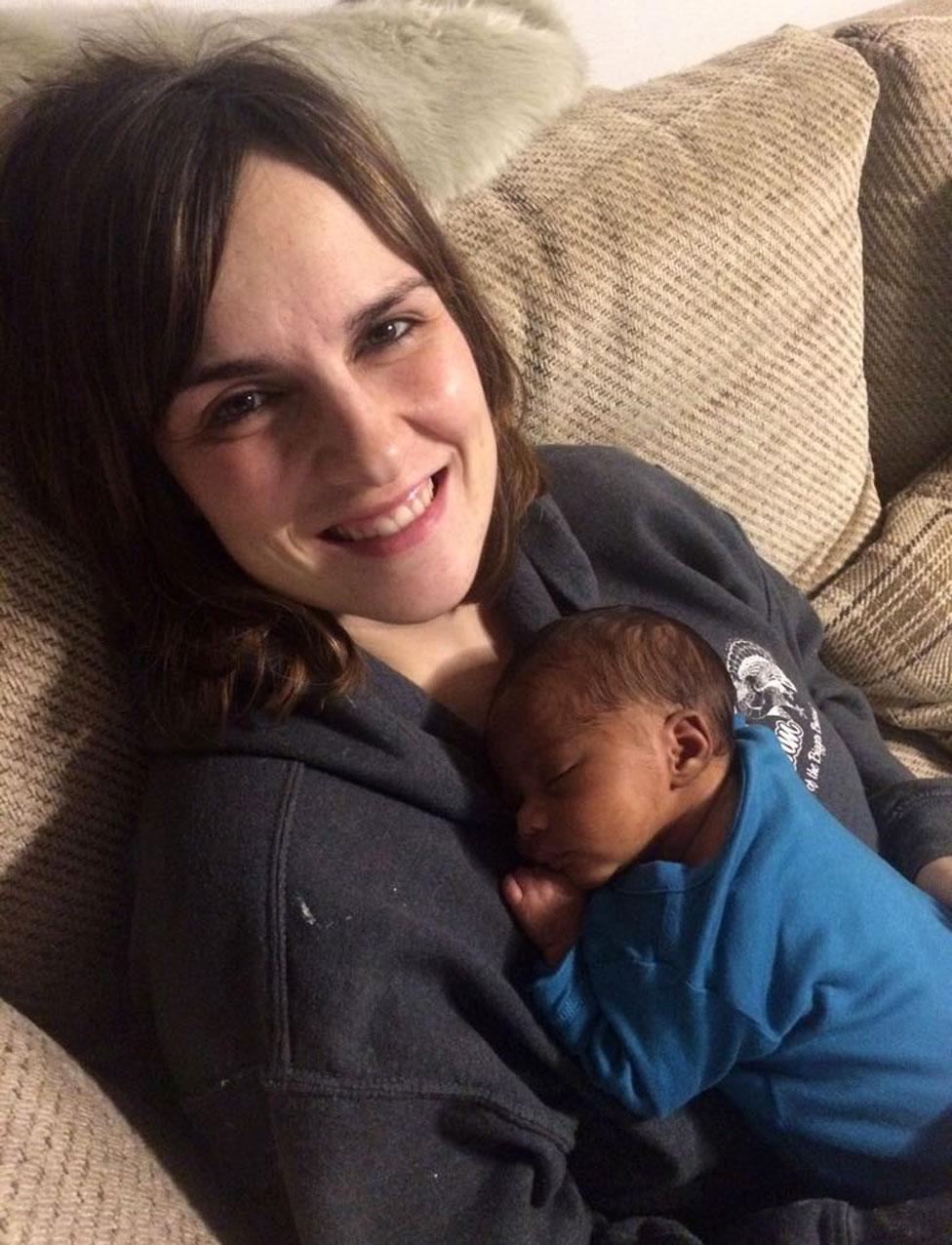
Anna with her second child, a boy

"It taught me that my thoughts don't need to control me, that I might have anxious thoughts or I might suddenly be affected by low mood, but actually that's not me, that's just thoughts that I can control and I can learn how to manage them.
"It absolutely doesn't make it go away, not for me anyway, and I think most people who have had mental health problems would say the same. It's not the same as a physical injury where, let's say you break your leg and then everything is better in a few months' time. It's not like that, but what it does do is give you the tools to be able to manage it and to be able to feel empowered and say, 'You know what, I sought help, I've got the tools now, if I start to feel anxious and low again I know what I can do,' and that gives you more confidence."
Babou says he did feel helpless at first but soon realised that he just needed to be there for his wife.
"I realised very quickly that apart from just being present, there wasn't anything I could do. She would have to walk the walk and I walk beside her, or even slightly behind. She has to lead the way completely."
Anna says that, throughout everything, Babou has been incredibly supportive and understanding.
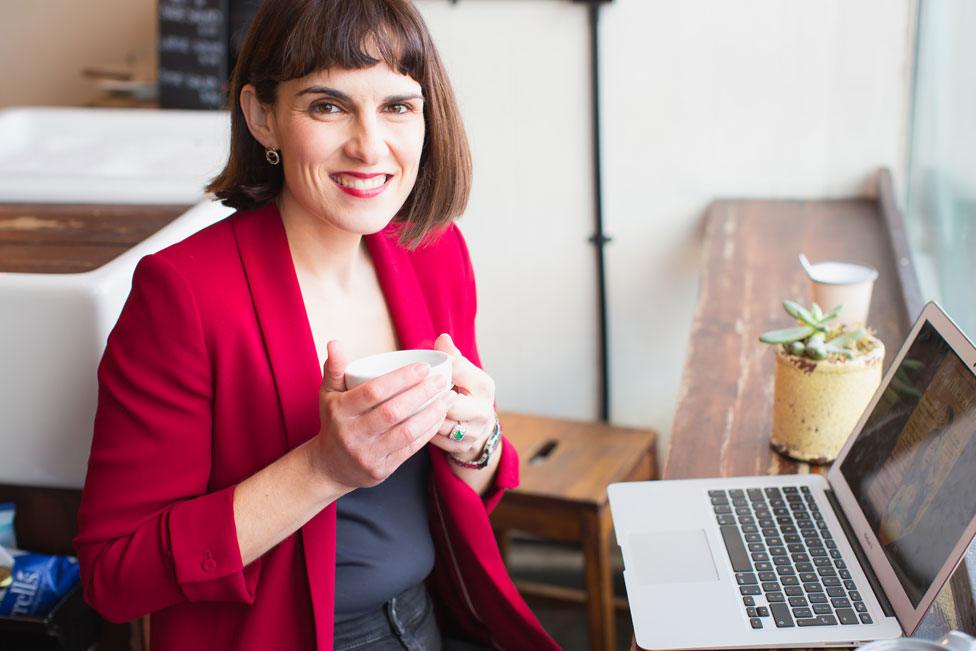
She says there is still a massive stigma around mental health.
"It's fashionable at the moment to talk about mental health, it's kind of in vogue, but in reality, I think a lot of people still don't necessarily reach out for help when they need it," she says.
This is one reason why she decided to set up Motherdom, a mental well-being magazine for parents of children under five.
"When I was at the darkest point, I did feel completely alone. And that is ridiculous. I wasn't completely alone, but that's how I felt, and anyone will tell you the nature of any kind of depressive illness is that it makes you feel isolated and I really wished there were more resources out there," she says.
"A lot of women think that's a normal part of life when you become a mum, that you're just going to feel awful and I think, 'No, you absolutely don't have to accept that.'"
Maybe in those rare periods of stillness, if and when they arise, parents should take time to ensure they are taking care of their own mental well-being, she suggests.
"I don't know any better way other than talking about it more," says Babou. "Communicating, reading about it, getting to know each other better - I think we'd have a much happier world, frankly."
Motherdom is available quarterly online and in print.
You may also be interested in:
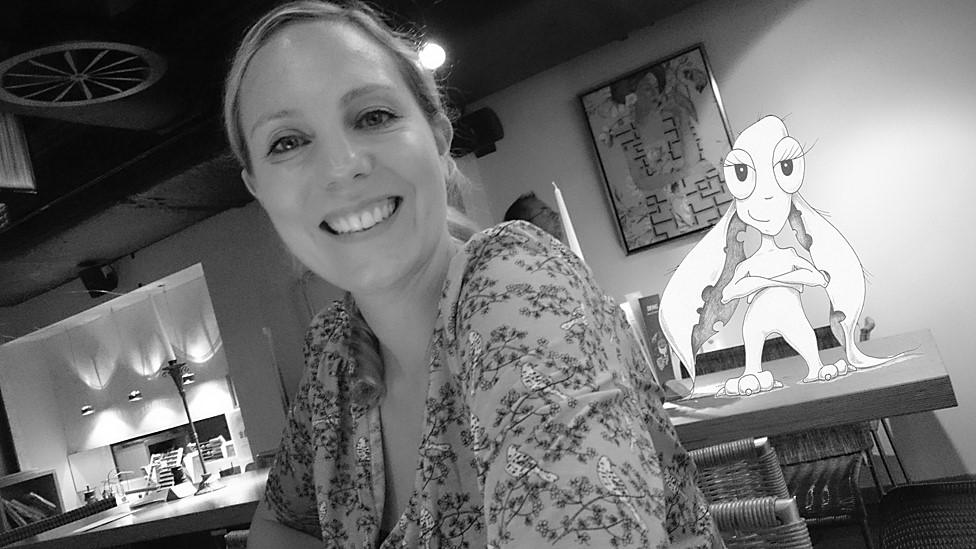
Catherine Benfield wasn't diagnosed with OCD until she was 31, after she had her first child. She recovered with the help of therapy - and by creating a character who personifies her obsessive-compulsive behaviour.